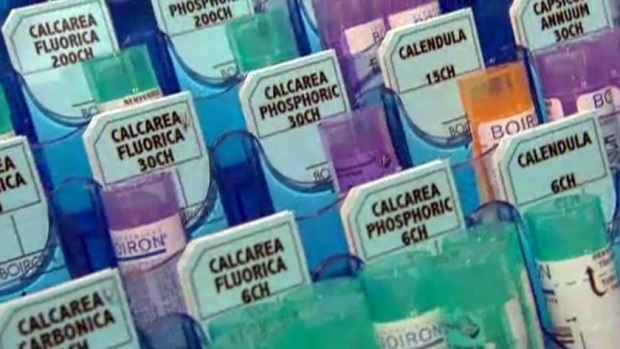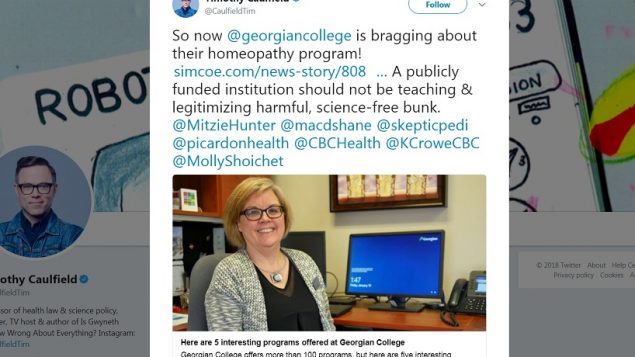Hocus-Pocus: Trick And Treat
"Homeopathy is a pseudo-science and this alone should be sufficient to reject the inclusion of such a program at a publicly funded institution."
"There are at least twelve international organizations that have evaluated the literature and again and again they find homeopathy does nothing."
"This [a respected institute of higher education legitimizing homeopathy] will likely result in patients delaying or even failing to seek effective health care for their ailments."
"[Homeopathy’s appeal is based on the] naturalistic fallacy — the idea that if it’s natural, it’s going to be better. And there’s nothing more natural than pure water with no active ingredient."
Dr. Chris Giorshev, chair, chronic pain section, Ontario Medical Association
"[The Barrie campus of Georgian College] will provide students with the theoretical, practical and clinical skills necessary to graduate with the competencies required to successfully meet the entry to practice requirements of the regulator body [College of Homeopaths of Ontario]."
"Georgian is seeing strong interest in the program."
"As an educational institution we welcome critical discussion and debate. It helps ensure the best possible curriculum and learning outcomes for our students."
"In an era of patient choice, it is important for the college to provide students with the most diverse education possible, including options for care and different methods."
Fay Lim-Lambie, dean of health, wellness and science, Georgian College
"Any talk about solutions having some sort of 'memory' is utter claptrap, and even if such memory would exist why should it have any therapeutic effect?"
"The real danger in homeopathy is not toxicology -- there's nothing in there."
"The real danger is toxicity to the mind because it can convince people to go down this ridiculous route when there actually might be treatments that can work for whatever condition they have."
Joe Schwarcz, director, McGill University Office for Science and Society
 |
| Critics say there is no scientific evidence that homeopathic compounds have any effect at all. Clinically unproven claims by makers of homeopathic treatments make them targets for class action lawsuits in the U.S PHOTO :CBC |
In 1796 a German physician by the name of Samuel Hahneman based his newly-founded philosophy of homeopathy on the assumption that "like cures like", theorizing that a substance causing symptoms in a healthy person will serve to cure those very same symptoms in someone who is ill. This supposedly works by placing the 'active' agent in water and ultra-diluting it. Devoted to the arcane conception that the more diluted the higher its potency, would seem counter-intuitive at any time, back then or at the present.
Those scorning the very basis of homeopathy point out that the final product is so "ridiculously diluted" it no longer holds a single molecule representing the original substance, when the product is finalized. Yet the theory holds that with each succeeding dilution and shaking of the water molecules the result is that a memory or "imprint" of the original substance is retained in molecular memory. Leading to its efficacy.
Yet the practice which is based on the philosophy that illness is treatable with massively-diluted substances which scientific critics point out is quite simply water mumbo-jumboed into a pretense of a magical potion, as a 'remedy' to illness, is being treated as a legitimate option to conventional medical treatment. Their ire is targeted at Georgian College which has created a three-year course with no science grounding, based solely on "magical thinking" that could result in great injury, lending the field an aura of official credibility.
Studies have concluded there is no reliable evidence through research in humans that homeopathic remedies are superior to placebos (sugar pills) in treatment of illnesses. Dr. Giorshev denounces the situation as unethical, when an academic institution sets out to teach students a program based on scientifically implausible principles. His point is obvious enough; that the gullible public may be led to assume that homeopathy represents a validated type of medicine.
 |
The curriculum presented by the Georgian College is inclusive of a discussion on the 'role' of nosodes -- homeopathic solutions claimed by natural-health practitioners and anti-vaccine advocates to be alternatives to vaccines against measles, mumps, polio and associated childhood diseases. When Ontario regulated the practice of homeopathy three years ago, the government was accused of legitimizing "quackery". It is public tax dollars that support the province's institutes of higher learning.
The National Health and Medical Research Council of Australia decided "there are no health conditions for which there is reliable evidence that homeopathy is effective", following an extensive review in 2015. The Council gave warning that homeopathy should never be used to treat conditions which are "chronic, serious or could become serious". Homeopathy "goes through the motions of health care, and looks a bit like medicine, but actually accomplishes nothing at all", wrote pharmacist Scott Gavura on his Science-Based Medicine blog.
And as far as Chris MacDonald -- who teaches ethics and critical thinking at the Ted Rogers School of Management at Ryerson University in Toronto -- is concerned, it represents bad ethics to spend public money "to supposedly teach people how to do something that we know doesn't work". In the United States, the U.S. Food and Drug Administration announced in December it plans to target homeopathic remedies marketed for diseases like cancer and heart disease, as well as for infant and children’s products.
 |
| Tim Caulfield , University of Alberta professor of Health Law and Policy was outraged to hear of a diploma program in homeopathy IMAGEl Caulfield -twitter |
Labels: Academia, Canada, Controversy, Health, Medicine, Research

0 Comments:
Post a Comment
<< Home